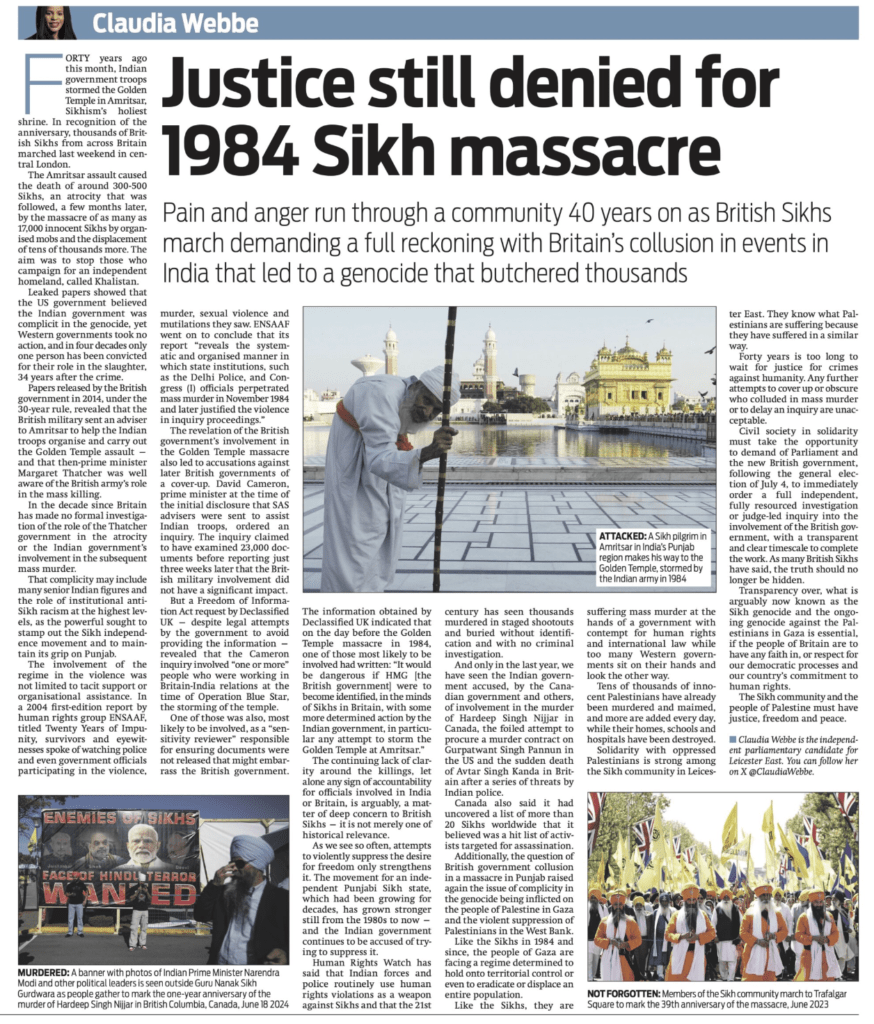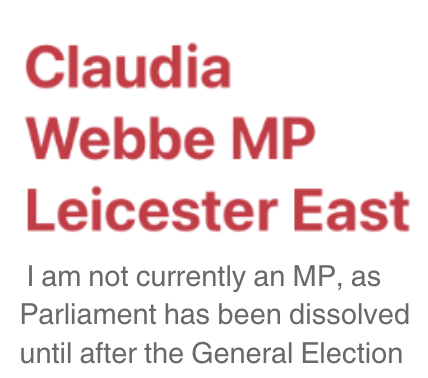
Justice still denied for 1984 Sikh massacre
By Claudia Webbe MP
Pain and anger run through a community 40 years on as British Sikhs march demanding a full reckoning with Britain’s collusion in events in India that led to a genocide that butchered thousands, writes CLAUDIA WEBBE MP
FORTY years ago this month, Indian government troops stormed the Golden Temple in Amritsar, Sikhism’s holiest shrine. In recognition of the anniversary, thousands of British Sikhs from across Britain marched last weekend in central London.
The Amritsar assault caused the death of around 300-500 Sikhs, an atrocity that was followed, a few months later, by the massacre of as many as 17,000 innocent Sikhs by organised mobs and the displacement of tens of thousands more. The aim was to stop those who campaign for an independent homeland, called Khalistan.
Leaked papers showed that the US government believed the Indian government was complicit in the genocide, yet Western governments took no action, and in four decades only one person has been convicted for their role in the slaughter, 34 years after the crime.
Papers released by the British government in 2014, under the 30-year rule, revealed that the British military sent an adviser to Amritsar to help the Indian troops organise and carry out the Golden Temple assault — and that then-prime minister Margaret Thatcher was well aware of the British army’s role in the mass killing.
In the decade since Britain has made no formal investigation of the role of the Thatcher government in the atrocity or the Indian government’s involvement in the subsequent mass murder.
That complicity may include many senior Indian figures and the role of institutional anti-Sikh racism at the highest levels, as the powerful sought to stamp out the Sikh independence movement and to maintain its grip on Punjab.
The involvement of the regime in the violence was not limited to tacit support or organisational assistance. In a 2004 first-edition report by human rights group ENSAAF, titled Twenty Years of Impunity, survivors and eyewitnesses spoke of watching police and even government officials participating in the violence, murder, sexual violence and mutilations they saw.
ENSAAF went on to conclude that its report “reveals the systematic and organised manner in which state institutions, such as the Delhi Police, and Congress (I) officials perpetrated mass murder in November 1984 and later justified the violence in inquiry proceedings.”
The revelation of the British government’s involvement in the Golden Temple massacre also led to accusations against later British governments of a cover-up. David Cameron, prime minister at the time of the initial disclosure that SAS advisers were sent to assist Indian troops, ordered an inquiry. The inquiry claimed to have examined 23,000 documents before reporting just three weeks later that the British military involvement did not have a significant impact.
But a Freedom of Information Act request by Declassified UK — despite legal attempts by the government to avoid providing the information — revealed that the Cameron inquiry involved “one or more” people who were working in Britain-India relations at the time of Operation Blue Star, the storming of the temple.
One of those was also, most likely to be involved, as a “sensitivity reviewer” responsible for ensuring documents were not released that might embarrass the British government. The information obtained by Declassified UK indicated that on the day before the Golden Temple massacre in 1984, one of those most likely to be involved had written: “It would be dangerous if HMG [the British government] were to become identified, in the minds of Sikhs in Britain, with some more determined action by the Indian government, in particular any attempt to storm the Golden Temple at Amritsar.”
The continuing lack of clarity around the killings, let alone any sign of accountability for officials involved in India or Britain, is arguably, a matter of deep concern to British Sikhs — it is not merely one of historical relevance.
As we see so often, attempts to violently suppress the desire for freedom only strengthens it. The movement for an independent Punjabi Sikh state, which had been growing for decades, has grown stronger still from the 1980s to now — and the Indian government continues to be accused of trying to suppress it.
Human Rights Watch has said that Indian forces and police routinely use human rights violations as a weapon against Sikhs and that the 21st century has seen thousands murdered in staged shootouts and buried without identification and with no criminal investigation.
And only in the last year, we have seen the Indian government accused, by the Canadian government and others, of involvement in the murder of Hardeep Singh Nijjar in Canada, the foiled attempt to procure a murder contract on Gurpatwant Singh Pannun in the US and the sudden death of Avtar Singh Kanda in Britain after a series of threats by Indian police.
Canada also said it had uncovered a list of more than 20 Sikhs worldwide that it believed was a hit list of activists targeted for assassination.
Additionally, the question of British government collusion in a massacre in Punjab raised again the issue of complicity in the genocide being inflicted on the people of Palestine in Gaza and the violent suppression of Palestinians in the West Bank.
Like the Sikhs in 1984 and since, the people of Gaza are facing a regime determined to hold onto territorial control or even to eradicate or displace an entire population.
Like the Sikhs, they are suffering mass murder at the hands of a government with contempt for human rights and international law while too many Western governments sit on their hands and look the other way.
Tens of thousands of innocent Palestinians have already been murdered and maimed, and more are added every day, while their homes, schools and hospitals have been destroyed.
Solidarity with oppressed Palestinians is strong among the Sikh community in Leicester East. They know what Palestinians are suffering because they have suffered in a similar way.
Forty years is too long to wait for justice for crimes against humanity. Any further attempts to cover up or obscure who colluded in mass murder or to delay an inquiry are unacceptable.
Civil society in solidarity must take the opportunity to demand of Parliament and the new British government, following the general election of July 4, to immediately order a full independent, fully resourced investigation or judge-led inquiry into the involvement of the British government, with a transparent and clear timescale to complete the work. As many British Sikhs have said, the truth should no longer be hidden.
Transparency over, what is arguably now known as the Sikh genocide and the ongoing genocide against the Palestinians in Gaza is essential, if the people of Britain are to have any faith in, or respect for our democratic processes and our country’s commitment to human rights.
The Sikh community and the people of Palestine must have justice, freedom and peace.
Claudia Webbe is the independent parliamentary candidate for Leicester East.
You can follow her at www.facebook.com/claudiaforLE and twitter.com/ClaudiaWebbe


